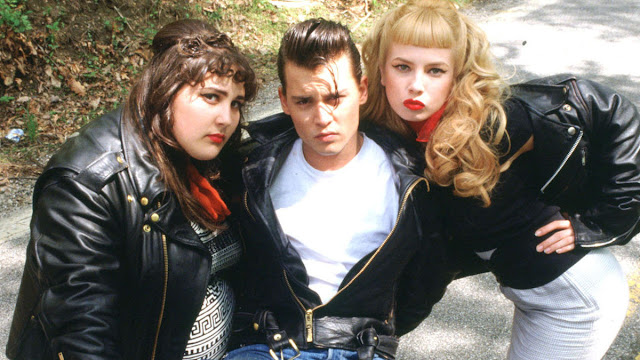Cry-Baby
In the mid-80s, Baltimore's own John Waters did something most unexpected: he directed a PG-rated musical called HAIRSPRAY. Those familiar with his underground films like PINK FLAMINGOS and FEMALE TROUBLE (to say nothing of EAT YOUR MAKEUP) must've had quite a chuckle. His new film did not feature grossly overweight transvestites or actors eating dog excrement. Instead came a satiric but gentle poke at early 60s America, a transitory time as the straight-laced, lily white culture of the 1950s was giving way to civil rights marches and school integration.
1990's CRY-BABY backs up a bit, to the mid-50s, but casts a similiarly squinted eye toward the zeitgeist, though this time our protagonists include rough, other-side-of-the-tracks type called "Drapes" in addition to the patently clean cut "squares". Caught between them is a "good girl" named Allison (Amy Locane) who falls in love with Wade "Cry-Baby" Walker (Johnny Depp). In the earliest scenes she sighs with boredom over her privileged life and cardboard boyfriend, Baldwin (Stephen Mailer). Next thing she knows, she's onstage at a local hangout singing onstage with Cry-Baby and his wild friends and family. But the "squares" show up and cause a ruckus. Cry-Baby ends up in the slammer.
Along the way, there are lots of songs. CRY-BABY is a snarky, yet affectionate spoof of '50s low budget teen musicals. If you've lain awake nights hoping to hear Mr. Depp sing, look no further. He brings a whole lotta energy and heart to it. Not to mention confidence. Contrast this with Matt Damon's hesitant jazz vocal in THE TALENTED MISTER RIPLEY, or anyone's solo in Woody Allen's EVERYONE SAYS I LOVE YOU.
Nearly everyone in CRY-BABY's eclectic cast gets to croon. In typical Waters fashion, that cast includes former glam boy Iggy Pop, former porn sensation Traci Lords, and former SLA member Patricia Hearst, who has the film's funniest moment during a courtroom scene. Waters' stock company players like Ricki Lake and Troy Donahue and Mink Stole (the latter two who play the parents of one of the Drapes, a tough chick called "Hatchet Face") are also present. The songs are appropriately goofy, over-the-top paeans to teen love, meant to evoke all those silly American International pics. Maybe even GREASE.
Goofy and over-the-top is an accurate way to describe CRY-BABY. Right down to a climatic game of "chicken", no teen musical staple is avoided. And Waters loves to revel in the seedy lifestyles of the Drapes. My favorite such moment is Cry-Baby's grandparents' (Pop and Susan Tyrell) unveiling of a custom-made crib for their next future grandkid. Next, we see the spotless world of the squares, staging a talent show filled with vanilla Pat Boone-like tunes. It's hard to tell if Waters is leveling the same scope at each social group, though I suspect he had equal fun lampooning the cluttered Drape landscape along with that of the spotless squares. And I think it's clear with which group he'd more identify.



Comments